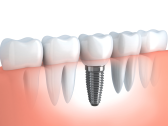By Natasha Gayle

Finding dental insurance that covers dental implants is challenging. This procedure is classified as cosmetic dentistry, which a lot of dental insurance plans will not cover.
Below, learn more about dental implants, tooth implant cost with and without dental insurance and discover a dental implant insurance alternative that can help you save money.

Dental Implants can cost anywhere between $1,600 and $8,200 per tooth without dental insurance. This pricing may vary. The cost of dental implants depends on many variables (i.e. the location of the tooth, the number of teeth, etc.).
Because most dental insurance plans do not cover this cosmetic procedure, we are unable to give an estimated cost of how much a dental implant is with insurance.
Keep in mind that some dental insurance plans may pay for part of the procedure, like the necessary tooth extractions or crowns that typically accompany the dental implant procedure.

For more information on pricing rates, see our 1Dental fee schedule, which includes average pricing of treatments without dental insurance.
Here's how:
For further detail:
Check Your Existing Dental Insurance Coverage. Thoroughly check your existing dental insurance coverage to see if it includes dental implants. If it does not include implant savings, then you may want to search online for a plan that might cover the procedure.
Understand What You'll Pay Out-of-Pocket. Bear in mind, however, that you cannot avoid out-of-pocket expenses entirely when considering oral treatments, especially for what is typically considered cosmetic dental work.
Find Your Annual Maximum and Where You Are in the Year. Investigate your existing policy to see if you already hit your annual maximum, which is the most amount of money your policy will pay per year. Otherwise, you might be responsible for the full cost of the treatment out-of-pocket.
Investigate the Reimbursement Option on Your Existing Plan. You may also want to investigate the reimbursement option on your existing plan. Understand how the process works with your particular insurance company, and use it wisely.
Call Your Dental Insurance Provider with Any Questions. If you find difficulty sifting through these terms and conditions, you may want to call the company and a few others to clarify your questions and compare coverage options
Talk to Your Dentist for Recommended Dental Plans that Cover Dental Implants. Your dentist may also be a helpful resource as well for recommending plans that will cover implants. If you are unable to determine if your current policy covers the procedure, your dentist may know this as well.
If your current policy says it covers implants, it may have hidden exclusions or exceptions. Still an “exclusion” clause for implants does not necessarily mean that absolutely zero benefits to will apply to the procedure.

Quick Tip: Classify your implant procedure as a “restoration” rather than “surgical therapy,” because some insurance companies will only reimburse you for “restoration” procedures.
Look at your current plan and examine its alternate benefit clause. Always double-check that you are referring to the procedure you need by its correct ADA code, because the smallest differences between procedures could mean the difference between any coverage for your implants and full payment out of your own pocket.
If you still cannot find a way to receive benefits for your implant surgery, you may want to look into the affordable alternative of dental savings plans. Often for specialty procedures such as implants, you can receive a contracted percentage off of your preferred treatment with these dental plans, without deductibles or maximums. Whichever type of plan you need to help you pay for implants, you can find multiple insurance alternatives online.
Dental Plans for Seniors
Learn how dental plans work, the cost and how to sign up!
Dental Insurance & Discount Plans Compared
Discover the differences & learn how they affect you
Wisdom Teeth Removal
Need your wisdom teeth out?
Dental Insurance
Check out affordable dental insurance alternatives
Low Cost Dental Work
Looking for ways to save on dental work?
Choosing a Plan
Tips on how to find what's best for you
Secondary Dental
What if I already have insurance?